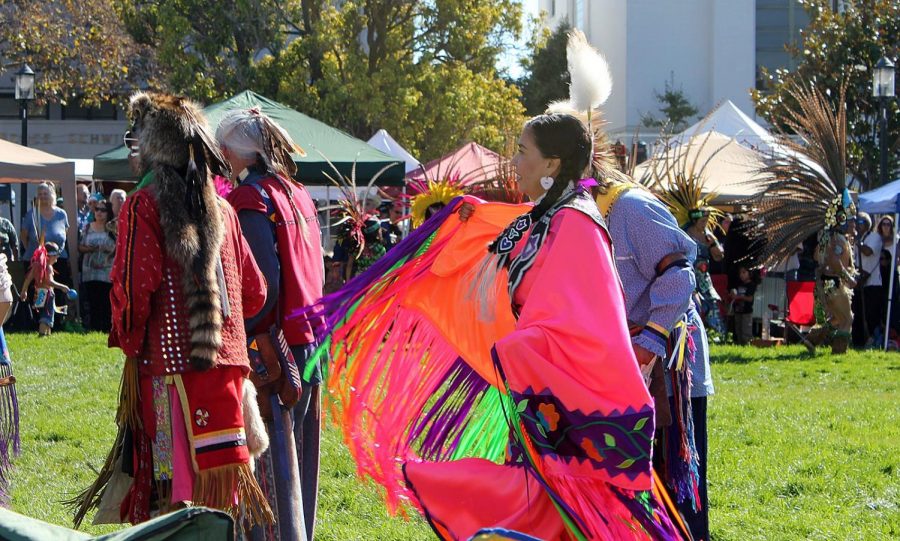America has moved beyond celebrating colonizers, it’s time to change Columbus Day to Indigenous Peoples’ Day
Photo used with permission under a Creative Commons License
People celebrate Indigenous Peoples’ day in Berkeley, California on October 13, 2012.
October 21, 2020
On Oct. 12, the United States celebrated Columbus Day, a holiday honoring the Italian explorer Christopher Columbus for his contributions to the U.S. Despite its long-standing place in American history, the holiday has come under fire for celebrating colonization and eurocentrism. After re-evaluating his legacy, it is clear that Columbus Day should be federally changed to Indigenous Peoples’ Day to condemn Columbus’ harmful actions towards Native Americans and raise awareness about their culture.
Columbus is celebrated for his discovery of mainland America even though he never actually set foot on it. “He didn’t actually find America or do anything; it was Native Americans who lived [here] first,” said junior Nisha Athery. “Giving him credit for finding it and giving him a whole day doesn’t really make sense.” By celebrating Columbus, thousands of years of Native American history is invalidated by disregarding the people who first discovered the continent.
Beyond just his failures as an explorer, Columbus and his men brought disease to the Caribbean, wiping out the Indigenous population and enslaving many of those remaining. Columbus Day is a celebration of European colonization which is insulting to Native Americans today. “Columbus Day celebrates a rapist, a criminal and someone who stole and colonized Native land. We should be celebrating Indigenous people, not [him],” sophomore Aarushi Gupta said.
These injustices continue today as Native Americans have been disproportionately suffering from COVID-19 due to historical mistreatment. In the past, the U.S government has stolen Indigenous lands, introduced discriminatory policies against native peoples and destroyed their communities. Little has been done to correct these wrongs and creating an Indigenous Peoples’ Day can hold the government accountable for their past actions.
Indigenous peoples are also severely disadvantaged with high unemployment rates, a lack of healthcare and conflicts with tribal land, exacerbating the effects of COVID-19. Federally changing Columbus Day to Indigenous Peoples’ Day helps begin conversations about how to support Native Americans in the present and future.
It is important to note that while changing Columbus Day to Indigenous Peoples’ Day is a step in the right direction, it is not enough to support the native population. “There is so much more we need to do for Indigenous People than just a day,” Gupta said. “Indigenous people need representation in government, bills passed to support their lands, proper protections from the government. Awareness is good but we also need action.”
Despite Columbus’ harmful deeds, many Italian Americans viewed him as a symbol of safety and freedom during the time of mob lynchings, xenophobic attacks and racism against Southern-European immigrants. These concerns should not be ignored, but there are many alternatives to Columbus Day that mutually benefit both Indigenous peoples and Italian Americans. For example, dedicating a day to Italian Americans to honor significant figures other than Columbus and celebrate their history and culture.
Another concern is that changing Columbus Day encourages historical revisionism, setting a bad precedent of erasing parts of history that we do not agree with. “If we allow uncontrolled tearing down of memorials or unilateral reinterpretation of American history, then we will be damaging our democracy by limiting vigorous debate on our history, with all its beauty and blemishes,” according to the New York Times. However, federally changing the holiday does not remove Columbus from history textbooks but rather reflects society’s changed perception of his actions.
Such changes begin by acknowledging the mistakes of the past and indicating how society’s values differ in the present. Columbus began the wave of colonization, enslavement and discrimination against Indigenous peoples in America. The vast majority of Americans now condemn his actions. Federally changing Columbus Day to Indigenous Peoples’ Day conveys America’s changed perspective on Columbus’ legacy, and gives Americans a chance to celebrate a culture that has been historically ignored.
History is fluid, just like humanity itself. There is no obligation to continue celebrating something that was traditionally celebrated. Society’s values change with time; abandoned traditions and pieces of human history are stored in archives and society’s collective memory. While Columbus will always be important in the development of our nation, Americans no longer need to glorify a legacy of pain and cultural decimation.


